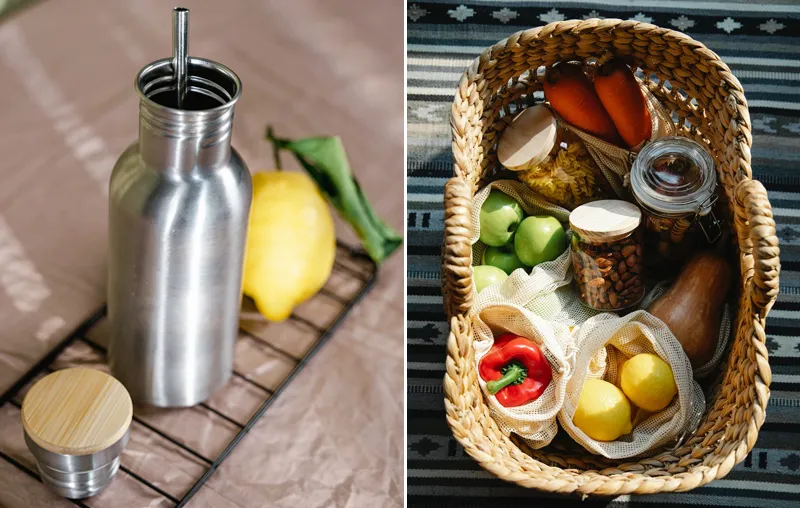You want to declutter sustainably and counteract the throwaway society? Then you've come to the right place! After a clear-out, quite a lot of things usually end up in the garbage can and in the incinerator - from furniture and slatted frames to carpets, pictures, bicycles and crockery sets. Careful, appreciative handling of the natural resources of our planet are respected by very few people.
Whether you're doing an apartment, business or household cleanout or just finally clearing out a specific room, attic, garage, junk room or basement, try to do it in a conscious, fair and sustainable way.
This is absolutely uncomplicated and experience has shown that it not only benefits the environment, but also other people and your wallet.
In this article I would like to give you the most important tips for a sustainable decluttering. Let's go!
Definition: What Is Decluttering?
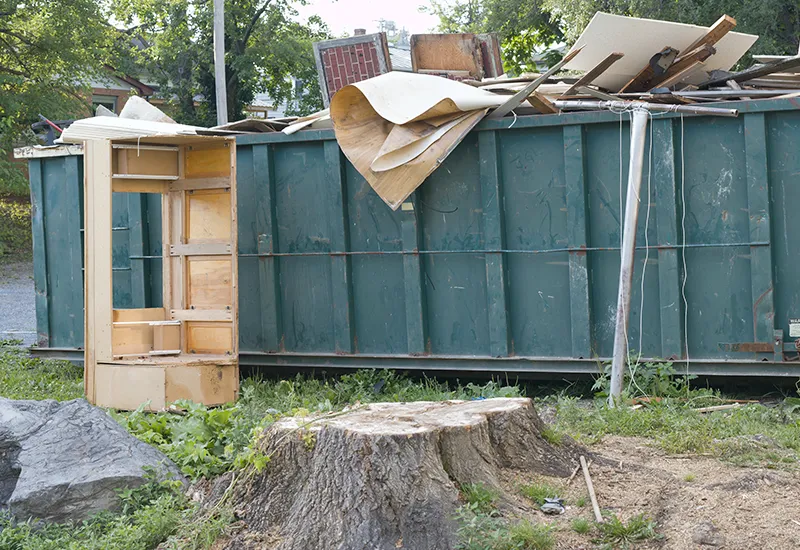
Under a decluttering is understood the Sorting out and disposing of worthless or no longer needed items (junk) from a house, apartment or special areas of the private environment.
It is done, for example, to restore Create space in your own four walls or often also in the course of a Household liquidation as a result of death, in which all furnishings, including all belongings of the deceased are disposed of, given away or sold.
Benefits: Why You Should Declutter Sustainably
So, a certain area or even a complete apartment or house should be tidied up. But why all this? On the one hand, to Clean chaos and the own Well-being through more space and the overview gained. Because a crowded room has a negative effect on your own psyche. In addition, however, by selling quite a few things you can also still increase your own Fill wallet a little.
But for what reasons should now be as possible sustainable declutter? Here I have some Advantages of environmentally friendly decluttering concisely compiled to keep motivation high at all times:
Valuing natural resources
By recycling as many things as you can from decluttering, you're helping to ensure that the Earth's resources conserved be
Quite simply by continues to use existing items and makes a new purchase (that is, the use of other natural resources by you or another person). avoid.
Protect the environment
Whether on the highest mountain peaks or in the most impressive depths of the oceans -. toxic man-made waste can now be found all over the world. By decluttering in an environmentally friendly way, you ensure that no more is added - and that animals, water, air and soil are protected.
Bring joy to other people
When you clean out a room or an entire apartment in an environmentally conscious way, you are usually left with very many items left for which you perhaps see no use, but which other people would still like to use.
By using them you donate, give away or sellYou can make sure that toys, furniture or bicycles, for example, get a second chance. Final disposal should always be the last alternative.
10 Tips: How to Declutter Sustainably
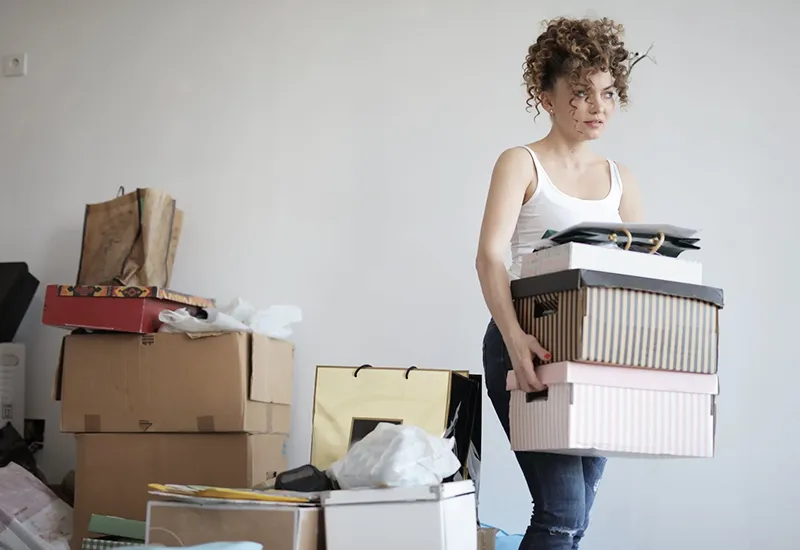
So sustainable decluttering has many benefits for you, the environment and other people. Now that you know the "why", we can move on to the "how", i.e. the promised tips for the ecological disposal or reuse of the "junk".
Use the following Advice and ideas to make a real differencenext time you're mucking out in a big way.
1. Hire an Eco-Friendly Decluttering Company
Depending on the size of the apartment and floor, decluttering can be a real major project. Garbage containers have to be ordered, furniture dismantled, countless trips made, and a no-parking sign placed in front of the front door in good time.
The most convenient and equally sustainable way is to find a professional waste disposal company that follows a green philosophy (e.g. "Reuse a lot, throw away a little!") and that will take care of the household or room in question. decluttered with professionals. This will of course save you time as well as physical and possibly mental stress. Simply enter "decluttering" and the name of the respective location in the search engine of your choice - for example: Clearing out Münster.
From experience, the emotional stress is particularly After deaths or during the dissolution of Messy HouseholdsThe people who lived there had a strong urge to accumulate and store objects.
A decluttering company can relieve you of this and other stress. Because as a rule, they not only take care of the Sorting and proper disposalbut also about the Reuse and the sale usable items.
Especially if you've been putting off decluttering for ages, this tip can be extremely valuable.
2. Prepare and Plan Your Own Decluttering Process
Now, of course, professional help with clearing out does cost something Money - but maybe you want them from the heart like to do yourself or just quickly clean out the storeroom, the shed, the garage, the garden shed or another specific room. Then, of course, it is also a good idea to become active yourself.
Fittingly, here are a few valuable tips for you that you should definitely consider in advance:
- Plan for intermediate stages: Determine a sub-area (e.g., basement, closet, kitchen island, or junk room) that you want to have decluttered on a given day. Such intermediate goals and small successes increase motivation and make large decluttering projects seem smaller.
- Get boxes and label them: Experience shows that you need sufficient quantities of boxes. Get a few more than you think you need - and label them sensibly.
- Rent construction waste container: If somewhat larger projects also involve construction waste such as bricks, tiles or clinker blocks, be sure to rent a construction waste container from a professional company in advance so that the Separate garbage properly and avoid duplicate work.
3. Use the Three-Box Method for Sorting
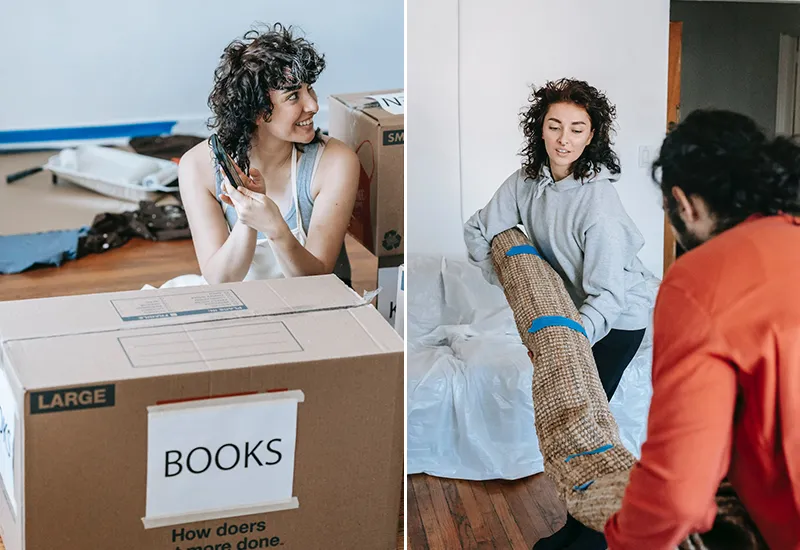
To sort your sustainably decluttered items in a clear and meaningful way, I can recommend the 3-box method. Simply label 3 boxes or three stacks of boxes "to dispose of," "to give away," or "to keep" and assign the things from the household in each case. This way, the hard-working helpers know what to do when they carry the boxes out of the house or apartment.
4. Donate Useful Items to Charitable Organizations
Whether it's furniture, pillows, blankets, pictures, rugs or dishes, charities near you can actually always use a few donated items from apartment clearouts - from social institutions for People with disabilities, senior citizens or homeless people, about Day care centers, Social department stores, Animal shelters, Refugee Housing, up to Artist studios.
To avoid unnecessary travel and so that as many things as possible are reused, it is advisable, call once before and to ask if and what is currently needed.
5. Donate Items to Second-Hand Stores
If social service organizations don't have a use for an item or two from sustainable decluttering, be sure to check it out at Thrift Stores and small Second-hand stores try
Whether cutting boards, cabinets, humps, baskets, kitchen utensils or books - there will always be searched for unique, cheap, individual and environmentally friendly bargains.
Tip: By the way, you can also give books to public bookcases in your area, as free reading material is welcome and used everywhere. Why you read books regularly By the way, I'll explain how you should do this in the linked blog post.
6. Sell Items at Flea Markets and Through Classified Ads
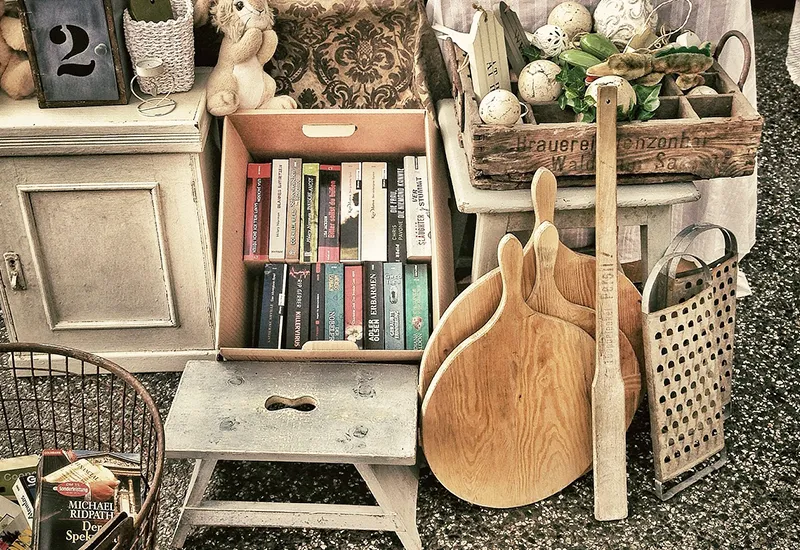
At local flea markets or flea markets, you can still save money by selling lots of discarded items from household liquidations or decluttering attics and garages. earn a euro or two.
There you are guaranteed to find buyers for things, for which you no longer have any use - and in this way you can, so to speak save money through sustainability.
7. Use Online Platforms to Sell Unwanted Items
Also online there are of course really good places to go to get the sorted out after the decluttering. Used items for sale. Interesting Books you can for example use Medimops* respectively Momox* sell to third parties. And find clothes in good condition via Kleiderkreisel guarantees a buyer.
Via online portals such as eBay Classifieds you basically get rid of any item. Also about local Facebook groups you can try it once.
8. Give Usable Items to Family and Friends
Of course, decluttering also brings out many things that family members, friends or people in your neighborhood would surely still take great pleasure in. At Asking acquaintances and friends, costs nothing.
By giving some discarded items to your acquaintances, you can be sure that they will be in good hands are and that less thrown away will.
9. Follow Local Waste Separation and Recycling Guidelines
If you want to declutter sustainably, you should of course take all the Items that cannot be kept, sold, given away or donated, properly separate and dispose of so that natural resources can be reused in the best possible way.
Ideally, you already have them during the decluttering process. presorted in an extra box. Especially with mixed product components, make sure that you separate them from each other as much as possible before you put them in the recycling.
It is best to subdivide the following wastes before disposing of them properly:
- Bulky waste Have it collected by the local waste disposal company or take it to a recycling center (e.g. slatted frames with metal springs or large carpets)
- Construction waste and mixed construction waste Take to the recycling center (e.g. bricks or cables)
- Waste wood Dispose of via bulky waste or hand in at a recycling center (e.g. chipboard, kitchen or ceiling panels)
- Cardboard and paper Dispose of in the blue garbage can (e.g. old folders and documents)
- Scrap metal Take to a recycling center or scrap yard (e.g. iron pans)
- Residual waste Dispose of in the black garbage can (e.g. wallpaper residue)
- Aluminum and plastics Dispose of in the yellow bag (e.g. tin cans and plastic bottles)
- Electronic scrap Take to the recycling center (e.g. microwave or hair dryer)
- Hazardous waste Take to a hazardous waste collection point or recycling center (e.g. energy-saving lamps)
10. Pay Special Attention to Hazardous Waste
Certain wastes require separate disposal, for example, due to their contaminant-rich components, and may not be not simply disposed of with household waste be. Hazardous waste can, for example, be pathogenic, flammable or explosive.
Here are some examples of leftovers from a decluttering that need to be disposed of separately:
- Waste oil
- Batteries
- Toner
- Energy saving lamps
- Paints and varnishes
Smaller quantities can be disposed of at the hazardous waste collection point of your municipality or at the recycling center. If the volume exceeds 1 m³ for each type of waste, you should order a container for hazardous waste.
Tip: Have you ever heard of Urban Mining heard? This is the recovery of raw materials through the reprocessing of existing goods in a particular environment. You can learn more about it in the linked blog post.
Sustainable decluttering made easy!
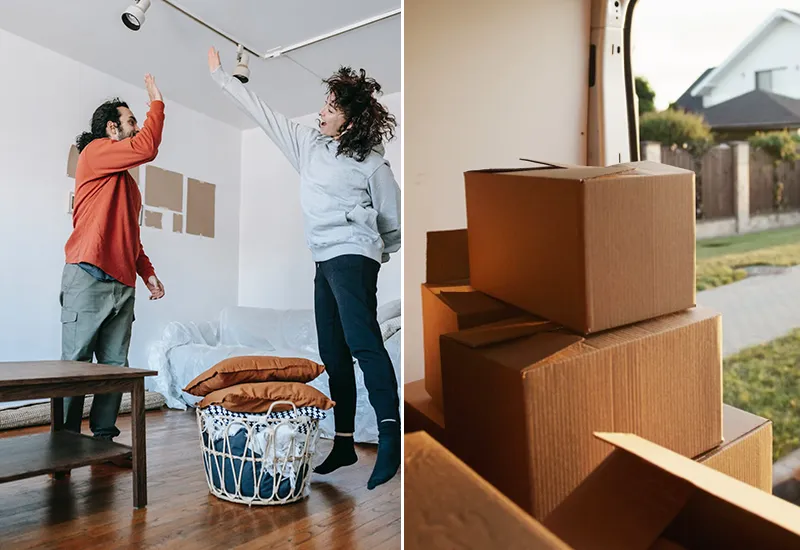
All items that appear during a decluttering have their value. Possibly no longer for you personally, but guaranteed for someone and for the environment. This is an important basic attitude of the sustainable lifestyle in the fight against Throwaway Society.
"Be the change that you wish to see in the world."
Mahatma Gandhi (more at Zero Waste Quotes)
I really hope that I was able to help you with this blog article and give you an eco-friendly decluttering experience. Do you have any questions, suggestions or other eco-friendly decluttering tips? Then I look forward to your comment.
Stay sustainable,

PS: You might also be interested in the article about the sustainable movewhich is hidden behind the link. Look gladly times purely!



